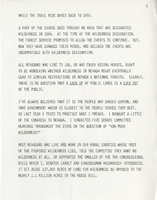Search the Special Collections and Archives Portal
Search Results
Claudine Williams Photograph Collection
Identifier
Abstract
The Claudine Williams Photograph Collection (approximately 2007-2009) consists of nine optical disks containing ninety-eight digital surrogate images dating between 1940 and 2000. The images primarily portray Claudine Williams in publicity images for various hotel and casinos Williams and her husband owned alongside prominent individuals, including Dean Martin, Hillary and Bill Clinton, and Robert Reich. Other images depict Williams in her youth and with her family members. Additional materials include images of Williams’ business cards, articles in various Las Vegas and Nevada magazines and newspapers on Williams, and images of properties Williams operated.
Archival Collection
Alpha Kappa Alpha Sorority, Incorporated, Theta Theta Omega Chapter Records
Identifier
Abstract
The Alpha Kappa Alpha Sorority, Incorporated, Theta Theta Omega (AKA TTO) Chapter records (1965-2020) are comprised of organizational records, conference programs, digitized copies of the chapter's scrapbooks, and copies of
Archival Collection
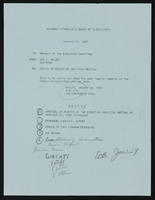
Economic Opportunity Board of Clark County (Nev.): memos, agendas, and meeting minutes
Date
Archival Collection
Description
From the Clark County Economic Opportunity Board Records -- Series I. Administrative. This folder contains memos, agendas and minutes from meetings of the Clark County Economic Opportunity Board from January 1969 through June 1969.
Text
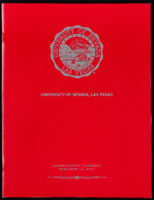
University of Nevada, Las Vegas (UNLV) Fall 2021 commencement program
Date
Archival Collection
Description
Commencement program from University of Nevada, Las Vegas Commencement Programs and Graduation Lists (UA-00115).
Text
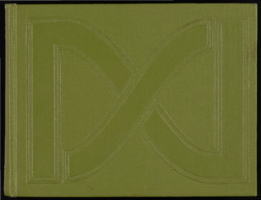
Epilogue: Nevada Southern University Yearbook, 1966
Date
Description
Yearbook main highlights: schools and departments; detailed lists with names and headshots of faculty, administration and students; variety of photos from activities, festivals, campus life, and buildings; campus organizations such as sororities, fraternities and councils; beauty contest winners; college sports and featured athletes; and printed advertisements of local businesses; Institution name: Nevada Southern University, Las Vegas, NV
Mixed Content
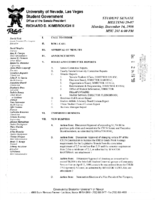
Meeting minutes for Consolidated Student Senate University of Nevada, Las Vegas, December 14, 1998
Date
Archival Collection
Description
Text

Transcript of interview with Barbara Agonia by Suzanne Becker, September 17, 2007, September 25, 2010, & October 2, 2007
Date
Archival Collection
Description
When Barbara Agonia arrived in Las Vegas in 1969 to pursue a Master's Degree in English, the University of Nevada Las Vegas was barely ten years old and the population of Las Vegas was just approaching 160,000 residents. At the time, she was 35 years-old and it was a decision and move that would forever change her life and higher education in Clark County. Barbara Agonia was born in St. Louis, Missouri, in 1934 to Robert Lewis Klinefelter and Suzanne Carter Klinefelter. At the time of Barbara's birth, her father worked for Brown Shoe Company in St. Louis. The family moved to Bunker Hill, Illinois when Barbara was still an infant. This was Mr. Klinefelter's hometown where a portion of the extended family still resided. In the late 1930s, Mr. Klinefelter got a job in a brass mill near Alton, Illinois, and he commuted there daily. When the United States entered World War II, Mr. Klinefelter tried to enlist in the army, but was rejected because he had two small children and because he worked in an essential industry. He decided to work in a non-essential industry and took a job at Montgomery Ward in Oak Park, Illinois. Barbara was in the third grade that year. Still unable to enlist, Mr. Klinefelter moved the family to Wabash, Indiana, and began working for General Tire in 1943. They moved to Logansport, Indiana in 1947. Agonia recounts that education has always been a significant part of her life, with the importance of a good education stressed in her life from early childhood forward. After graduating from high school in Logansport, Indiana, she attended Hanover College in southern Indiana, enrolling in 1952. Her educational experience at Hanover included a year studying abroad at the University of Exeter in Devonshire, England—an experience which Agonia credits as further cementing her commitment to education and her love of literature and language. She graduated from Hanover in 1957 with a double major in English and speech/ theater. Agonia spent her first years out of college teaching high school English, speech, and theater in west central Illinois and the next eight in northern Illinois. A little over ten years into her career, at the age of 35, she decided to pursue a Master's degree in English. Her sister, Martha, who at the time lived in Las Vegas, suggested checking into programs offered at the city's newly formed university. In 1969, Barbara moved to Las Vegas and enrolled in the English Department at UNLV. As Agonia was completing her degree in 1971, the community college system in Nevada was emerging and seeking faculty for the up and coming institution. Curious to know more about the new system, Agonia scheduled a meeting with the person in charge of hiring. Two hours later, she walked out with a contract in her hand, one of eight new faculty members at Clark County Community College, now known as College of Southern Nevada. In her early years with the college, Agonia did a great deal of public speaking on behalf on the newly formed system, promoting the new institution and reaching out to potential students. At the same time, she taught full course loads in composition and literature, and eventually became chair of the English department. Her new position and public speaking work on behalf of the college not only provided her contact with the local Las Vegas community, it ultimately became the catalyst in spurring her passion for community involvement, particularly working on behalf of women within the community. • • Vll As the 1980s approached, Agonia became actively involved in rape crisis education, at the urging of Florence McClure. Then, in 1980, Agonia was again in on the ground floor of community programming, when she and Beverly Funk, at the urging of Judith Eaton, the president of Clark County Community College, established a Women's Center on campus. The Center was initially set up to help women in a variety of life circumstances, including women who were wanting to return to school or who were new to the process of school altogether. The center eventually became the Re-Entry Center offering skill development, tutoring programs, and other forms of assistance for anyone interested in returning to school. In addition to her involvement in and commitment to public education, Agonia has also been involved in the Soroptimist International organization for business and professional women who work to improve the lives of women and girls in local and international communities. In the Las Vegas area, Soroptimist International of Greater Las Vegas worked to establish the Rape Crisis Center and the Center for Domestic Violence, which later became SafeNest. Agonia has been working with the organization since 1982. Through Soroptimist International, she also became involved in Friends of the Nevada Wilderness, an organization devoted to designation and long-term protection of Nevada's wilderness areas. As the representative for Soroptimist International, she traveled to Washington to lobby and testify in front of the senate for the establishment of Great Basin National Park. Agonia's work in the Las Vegas community over the past forty years has been significant. She counts Florence McClure, Geneva Douglas, and Jean Ford amongst her greatest influences. As she notes in her oral history, "I learned how to be radical from those women." She happily embraces the label of radical. This attitude surfaces throughout Agonia's experiences and recollections, and underscores her work and dedication to the interplay of local education and women's issues within Nevada.
Text
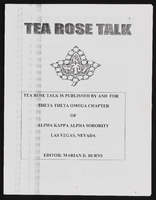
Alpha Kappa Alpha Sorority, Theta Theta Omega Chapter "Tea Rose Talk" newsletters
Date
Archival Collection
Description
From the Alpha Kappa Alpha Sorority, Incorporated, Theta Theta Omega Chapter Records (MS-01014) -- Chapter records file.
Text

Transcript of interview with Bruce M. Eaton by Jay Brewer, April 24, 1975
Date
Archival Collection
Description
On April 24, 1975, Jay Brewer interviewed Bruce M. Eaton (born 1904 in Toronto, Kansas) about his life in Nevada and more specifically on the growth of Boulder City. Eaton first talks about his family’s move to Nevada and his work as a laborer for Six Companies during the construction of the Boulder Dam and his eventual employment with the Bureau of Reclamation as a general foreman. He also talks about the work conditions on the Boulder Dam, including the protection by Army personnel during the time of World War II. Eaton also describes the details of a federal investigation involving Eaton, a case of suspected espionage, and some of the racial conflicts that existed at the dam. Eaton then discusses his enlistment into the United States Navy and the incident that led him to be medically discharged before a deployment. He then describes the role of several Nevada legislators in helping the growth of Boulder City and his interactions with them. Eaton then discusses his role as city manag
Text

